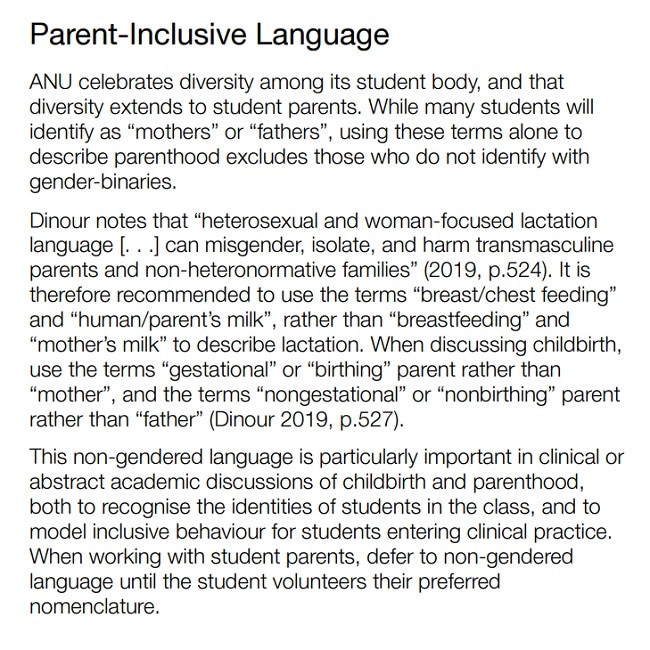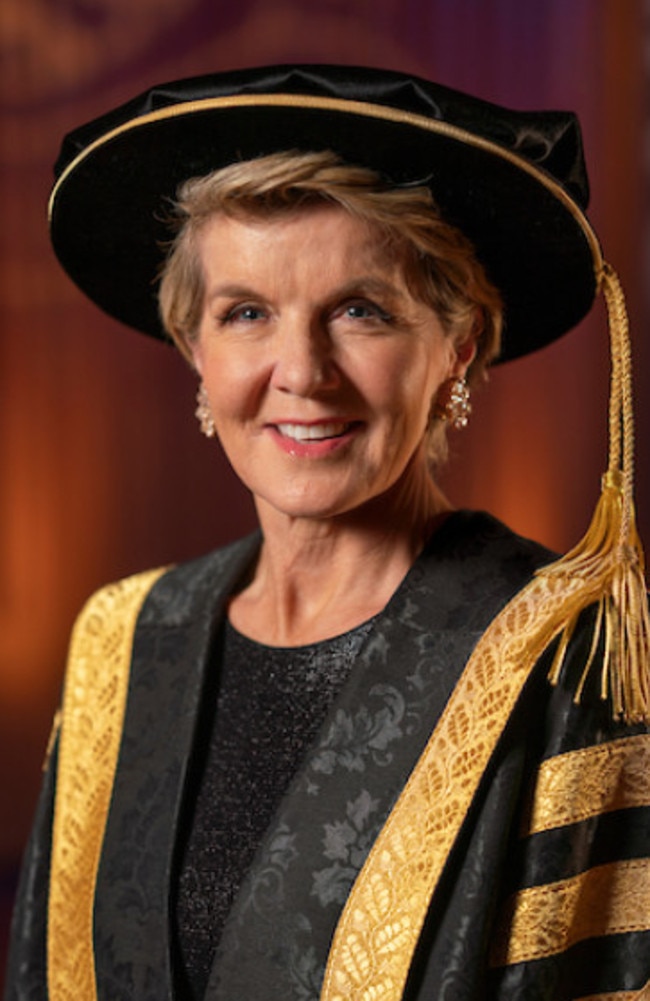ANU urges staff to say ‘chestfeeding’ instead of ‘breastfeeding’, ‘gestational parent’ instead of mother
The country’s leading university has asked staff to adopt “gender-inclusive” parenting language such as “chestfeeding” and “human milk”.
Australia’s leading university has encouraged staff to use “parent-inclusive language”, such as “chestfeeding” instead of “breastfeeding” and “human milk” rather than “mother’s milk”.
Similarly, the terms “mother” and “father” should be replaced with “gestational” and “nongestational” parent, according to the Australian National University’s Gender-Inclusive Handbook.
Published last year by the Canberra university’s Gender Institute, the handbook describes itself as a guide intended for “any ANU student or staff member involved” in teaching.
It offers recommendations to “uplift female and gender minority students”.
In a section about student parents, the handbook notes that while “many students will identify as ‘mothers’ and ‘fathers’, using these terms alone to describe parenthood excludes those who do not identify with gender-binaries”.
It cites a 2019 study by researcher Lauren Dinour, who claimed that “heterosexual and woman-focused lactation language … can misgender, isolate, and harm transmasculine parents and non-heteronormative families”.
“It is therefore recommended to use the terms ‘breast/chest feeding’ and ‘human/parent’s milk’, rather than ‘breastfeeding’ and ‘mother’s milk’ to describe lactation,” the handbook states.
“When discussing childbirth, use the terms ‘gestational’ or ‘birthing’ parent rather than ‘mother’, and the terms ‘nongestational’ or ‘nonbirthing’ parent rather than ‘father’.”
The guide says this non-gendered language is “particularly important in clinical or abstract academic discussions of childbirth and parenthood, both to recognise the identities of students in the class, and to model inclusive behaviour for students entering clinical practice”.
“When working with student parents, defer to non-gendered language until the student volunteers their preferred nomenclature,” it says.

A spokeswoman for the ANU distanced the university from the handbook.
“This is a guide produced by a research institute that, among its many areas of focus, examines how to improve gender equity and inclusiveness in our society,” she said in a statement.
“The guide is an academic output produced by experts who are free to research in their field of expertise under our policies on academic freedom. This document is not an official ANU policy, process or official prescription to staff and students. It is a guide developed by expert researchers to assist anyone committed to enhancing inclusiveness and diversity.”
Despite the ANU’s insistence that it was not an “official prescription”, the handbook itself lays out examples of “positive actions” being taken by individual colleges at the university to implement “gender-inclusive teaching”.
The College of Health and Medicine and the College of Science, for example, states that it uses “gender-inclusive language” such as “they/them” rather than “he/him” or “she/her”, and offers “unconscious bias” training to all staff.
Worryingly, the College says staff have “reported issues with students undermining female-identifying tutors” and there are “issues associated with condescending discourse (and/or ‘mansplaining’) by students to other students”.
The College of Law states that feminist scholar Emerita Professor Margaret Thornton is “working to make curated, inclusive curriculum resources”, while the College of Asia and the Pacific highlights a project with Indigenous scholars to “decolonise” academic work.
Asked whether the handbook was supported or encouraged by the university, the spokeswoman confirmed the university was “committed to equity and diversity and ensuring we reflect the broad nature, background and experiences of Australians and our society, as well as a being a safe and welcoming campus for all people”.
“The University has a range of official policies and guidelines in place that support equity and diversity across our campus and community,” she said.

Speaking to The Daily Telegraph, which first reported on the handbook on Tuesday, University of Sydney sociologist Associate Professor Salvatore Balbones cautioned against trying to dictate language.
He suggested some of the new terms could lead to confusion.
“Most people don‘t know what parent’s milk is and would question what it means,” he said. “If someone said parent’s milk they might be looking for a brand of milk named parent’s milk.”
It comes after a UK hospital last week issued similar “gender-inclusive” language guidelines, telling staff to use terms including “birthing parents” and “human milk” to avoid offending transgender people.
Brighton and Sussex University Hospitals NHS Trust – which has renamed its maternity department “peri-natal services” – said the move was designed to be “inclusive of trans and non-binary birthing people without excluding the language of women or motherhood”.
The 19-page policy document stated that there was “currently biological essentialism and transphobia present within elements of mainstream birth narratives and discourse”, the Daily Mail reported.
In 2018, a 30-year-old transgender woman made headlines after reportedly managing to breastfeed her baby in the first documented case of its kind.
The case study, which did not identify the woman, was reported in the journal Transgender Health by Dr Tamar Reisman and Dr Zil Goldstein from the Mount Sinai Center for Transgender Medicine and Surgery in New York.
The experimental treatment regimen included hormones, breast stimulation and an anti-nausea drug. After one month she was able to express “droplets”, and after three-and-a-half months she was producing about 240mL of breast milk per day.
“She was able to achieve sufficient breast milk volume to be the sole source of nourishment for her child for six weeks,” the study authors wrote.




